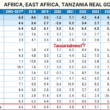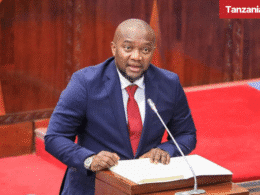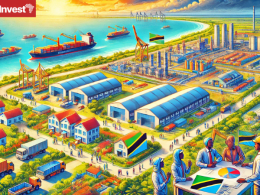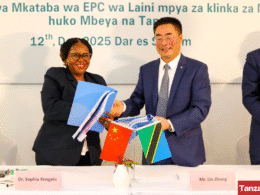TANZANIAINVEST has been interviewing Hon. Mary Nagu, former Minister of Industry, Trade and Marketing, to talk about Tanzania’s investment opportunities in indutrial development, export of semi-processed products and in other key sectors of Tanzania’s economy, as well as the role of China within such framework.
| Hon. Mary Nagu Minister of Industry Trade and Marketing of Tanzania |
TanzaniaInvest.com: Thank you very much for receiving us. In January 2010 you met with Chinese Minister of Commerce Chen Deming during his visit here in Tanzania. Can you give us an overview of the trade relations between Tanzania and China?
Minister Nagu: With China we frequently exchange Ministerial visits to consolidate the already existing relationships.
When it comes to trade, 6.6% of our exports go to China and 7.3% of total imports come from China.
So you can see how significant China is for us and I do believe that the trade had increased as a result of the Sino-Africa cooperation arrangement introduced by the Chinese government in 2003.
Through that arrangement Tanzania has been given a very special preferential treatment- duty free, quota free.
It started with a few items, about 400 products in 2005, has increased to 4000.
China is also one of the leading investors in Tanzania. By 2008 China had 228 investment projects with a value of 527mn USD employing more than 51,000 people.
In addition to that Tanzania’s strategic location makes it is a gateway to trade with other African countries, also because we belong to regional trade blocks, such as the East Africa Union, and SADC (Southern African Development Community) with a total population of about 300 million people{xtypo_quote_left}Tanzania’s strategic location makes it is a gateway to trade with other African countries, also because we belong to the East Africa Union and SADC with a total population of about 300 million people{/xtypo_quote_left}.
Furthermore very soon we will have the three regions of East Africa, SADC, and COMESA (Common Market for Eastern and Southern Africa) coming together as a free trade area, with about 700 million people.
Not only that, but Tanzania has a lot of potential when it comes to its natural resources. We have a lot of minerals which are yet to be exploited, we have very good arable land for products for export or for internal use and to make sure that we increase our food security as well.
So of course what China would like to see in Tanzania is peace and stability. No one would want to come and invest in a country where there is no peace and stability. This is what, in Africa, Tanzania stands for. Peace, stability, and democracy.
TI: Which are the biggest priorities for the government in the framework of Tanzania’s relationship with China?
MN: Tanzania right now is giving a lot of priority to agriculture, because 80% of Tanzanians economic activity is in agriculture.
Tanzania is also endowed with very good arable land so if you want to make a big change to improve people’s economic lives, to bring prosperity to Tanzania, it is preferable to go into agriculture than to other areas, especially if you have budget limitations.
At the same time in Tanzania we believe that you cannot separate agriculture and industry, especially agro-processing and agro-business.
So we invite investors coming to Tanzania to support us in agro-processing to add value instead of us remaining traders of natural resources and raw materials{xtypo_quote_right}We invite investors coming to Tanzania to support us in agro-processing to add value instead of us remaining traders of natural resources and raw materials{/xtypo_quote_right}.
In relation to Mining, it is important to note that Tanzania has a lot of iron and coal in the southern part of Tanzania in a place called Mchuchu and if we could exploit these resources we could be producers of steel, which is in high demand in the world including in China.
Finally tourism is also among our priorities where we look for new investments mainly in hotels development.
TI: Given the fact that one of the Ministry’s mandates is marketing, what are you doing to market these opportunities, to potential foreign investors?
MN: We are branding our country in such a manner that people see potential, for example, in the peace and stability that exist in this country and the friendliness and hard work of Tanzanians.
We also send trade missions out, we also welcome foreign trade missions to come and see what is available in our country.
Besides that, we are also participating in international expo and trade faire like the 2010 expo in Shanghai, so we are also using our trade missions to advertise Tanzania.
We also try our best to be very friendly to the people who come to this country and to show them the friendly part of Tanzania; you must have witnessed that yourselves.
We have so many ways of branding Tanzania and selling Tanzania outside and attracting investment to Tanzania; this is the role of my Ministry and that of the Ministry of Economy.
TI: So what are the core values that you would like to convey with the Tanzanian brand to foreign investors?
MN: Well, we have many. We are in Africa, and we are an island of peace and stability.
We are a force when it comes to integrating Africa. We helped other countries of Africa to gain independence; we are now in the forefront of integrating Africa so that we become one big continent with one voice.
This is a continent where the economic growth right now is very high, where when you invest and the return on what you invest is very high, and given that we are in Africa, and we are a stable country, those benefits will be more obtainable in Tanzania than elsewhere.
We are a very, very big sleeping giant and have a lot of natural resources, we are an open economy and I think these are attributes that any investor would like to find.
We are also very strategically located, in the middle of Africa, so we are a gateway to other African countries.
We have six landlocked countries around us which use the Dar es Salaam port so it is not just a question by of advertising ourselves, it is a reality: we are a gateway to other African countries and to Europe as well.











